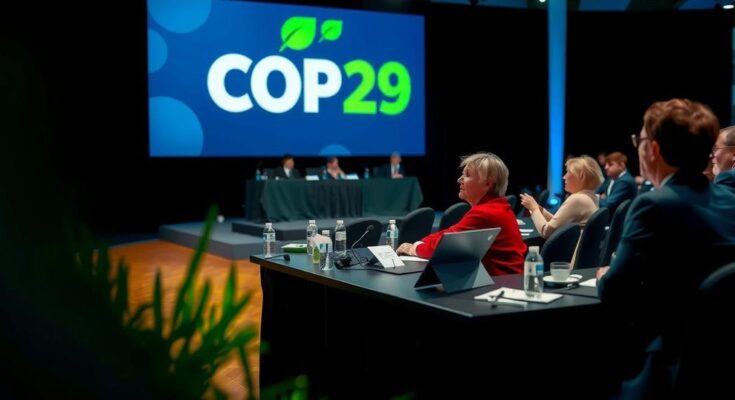At COP29 in Azerbaijan, world leaders offered conflicting approaches to climate change, with a report indicating the need for net-zero carbon emissions by the late 2030s. Some leaders defended fossil fuels while those from vulnerable nations stressed the urgency for action. Financial negotiations remain a key point of contention as developing countries seek substantial commitments from wealthier nations for climate adaptation and transition.
Global leaders presented divergent approaches to confronting climate change during the COP29 discussions in Azerbaijan. A new report highlighted the urgent need for the world to attain carbon neutrality by the late 2030s, much sooner than the previously targeted 2050. This report was particularly alarming as carbon emissions from fossil fuels have surged to unprecedented levels this year, according to findings from the Global Carbon Project. Negotiators are focused on securing financial commitments to assist developing nations in adapting to climate challenges and transitioning to sustainable energy sources. Amid these discussions, stark disagreements emerged among leaders. Azerbaijani negotiator Yalchin Rafiyev emphasized the diminishing window for action, stating, “the time window is narrowing, shrinking — and we need to act urgently.” Contrarily, some leaders defended continued fossil fuel usage, arguing for a balanced approach to sustainability. Italian Prime Minister Giorgia Meloni remarked on the necessity of a pragmatic theory concerning energy production, saying, “An approach that is too ideological… risks taking us off the road to success.” This sentiment found little support from those representing nations severely impacted by climate change, with Tuvalu’s Prime Minister urging immediate action against fossil fuels. As negotiations progressed, a draft deal aimed at climate finance emerged, signaling potential pathways for funding but still lacking consensus on pivotal issues. Many developing nations continue to advocate for a substantial annual financial commitment from richer countries, arguing that existing contributions are grossly inadequate. Amidst economic downturns, many donor countries have expressed reluctance to increase direct funding, favoring mobilization of private sector resources instead—an approach which has received criticism as unrealistic. While the US climate envoy called for new contributors to shoulder their share, many developing countries are pushing for grants rather than loans to alleviate their mounting debts. The urgency of financing solutions is underscored by Prime Minister Philip Davis of the Bahamas, who highlighted an alarming discrepancy in climate finance versus debt repayment. The divide in perspectives at COP29 underscores a critical moment for global climate policy, requiring swift and collaborative action to meet the pressing challenges posed by climate change, particularly as major powers reconsider their commitments to existing agreements. Overall, the consensus remains clear: immediate and decisive action is imperative to avert further climate degradation.
The COP29 climate conference represents a vital platform for global leaders to negotiate strategies to address climate change. The consequential shift in emissions and the call for nations to hasten their journey towards carbon neutrality is compounded by growing concerns over inadequate funding for developing nations, who are often the most vulnerable to climate impacts. The urgency for revised timelines and financial commitments is prompted not only by the stark realities presented in recent scientific reports but also by the social and political pressures amplified through the rhetoric of national leaders. The interplay between fossil fuel dependency and the urgency for sustainable practices illustrates the tension shaping current climate policy dialogues.
The discussions at COP29 reveal a significant divide among global leaders regarding the urgency and approach to climate change action. While some advocate for immediate transitions away from fossil fuels, others caution against hasty decarbonization efforts that may jeopardize economic stability. The negotiations on funding for developing countries are pivotal, with a clear call for increased financial commitments to facilitate their adaptation and transition efforts. The contrasting narratives highlight the complex interplay between environmental necessity and economic realities that must be navigated to achieve a unified global response to the climate crisis.
Original Source: www.rfi.fr




